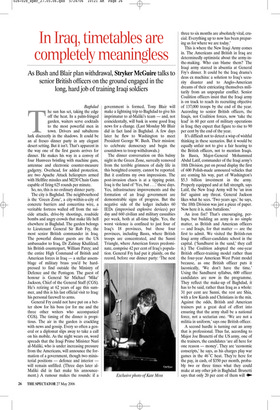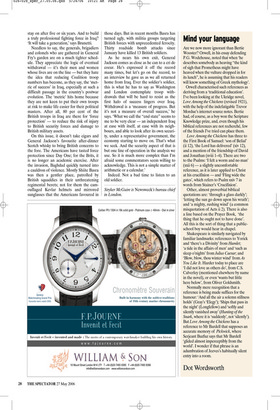In Iraq, timetables are completely meaningless
As Bush and Blair plan withdrawal, Stryker McGuire talks to senior British officers on the ground engaged in the long, hard job of training Iraqi soldiers
Baghdad
The sun has set, taking the edge off the heat. In a palm-fringed garden, waiters serve cocktails to the most powerful men in town. Drivers and subalterns lurk discreetly in the shadows. It could be an al fresco dinner party in any elegant desert setting. But it isn’t. That’s apparent in the way one of the first guests arrives for dinner. He makes his way in a convoy of four Humvees bristling with machine guns, antennae and electronic counter-measure gadgetry. Overhead, for added protection, are two Apache Attack helicopters armed with Hellfire missiles and M230 Chain Guns capable of firing 625 rounds per minute.
So, no, this is no ordinary dinner party.
The city is Baghdad. The neighbourhood is the ‘Green Zone’, a city-within-a-city of concrete barriers and concertina wire, a veritable fortress walled off from the suicide attacks, drive-by shootings, roadside bombs and angry crowds that make life hell elsewhere in Baghdad. The garden belongs to Lieutenant General Sir Rob Fry, the most senior British commander in Iraq. The powerful dinner guests are the US ambassador to Iraq, Dr Zalmay Khalilzad; his British counterpart, William Patey; and the entire High Command of British and American forces in Iraq — a stellar assemblage of military brass you’d be hardpressed to find outside the Ministry of Defence and the Pentagon. The guest of honour is General Sir Michael ‘Mike’ Jackson, Chief of the General Staff (CGS). He’s retiring at 62 years of age this summer, and this is his last official visit to Iraq: his personal farewell to arms.
General Fry could not have put on a better show for his boss (or for me and the three other writers who accompanied CGS). The timing of the dinner is propitious. The air in the garden is crackling with news and gossip. Every so often a general or a diplomat slips away to take a call on his mobile. As the night wears on, word spreads that the Iraqi Prime Minister Nuri al-Maliki, who is under increasing pressure from the Americans, will announce the formation of a government, though two ministerial positions — defence and interior will remain unfilled. (Three days later alMaliki did in fact make his announcement.) A rumour makes the rounds: if a government is formed, Tony Blair will make a lightning trip to Baghdad to give his imprimatur to al-Maliki’s team — and, not coincidentally, will bask in some good Iraq news for a change. (Last Monday Mr Blair did in fact land in Baghdad. A few days later he flew to Washington to meet President George W. Bush. Their mission: to celebrate democracy and begin the countdown to troop withdrawals.) The dinner conversation on this balmy night in the Green Zone, surreally removed from the terrible grimness of daily life in this benighted country, cannot be reported. But it confirms my own impressions. The post-invasion chaos is at a tipping point. Iraq is the land of ‘Yes, but ...’ these days. Yes, infrastructure improvements and the formation of an Iraqi government are demonstrable signs of progress. But the negative side of the ledger includes 60 IEDs (improvised explosive devices) per day and 660 civilian and military casualties per week, both at all-time highs. Yes, the worst violence is confined to just four of Iraq’s 18 provinces, but those four provinces, including Basra, where British troops are concentrated, and the Sunni Triangle, where American forces predominate, comprise 42 per cent of Iraq’s population. General Fry had put it plainly, on the record, before our dinner party: ‘The next three to six months are absolutely vital, crucial. Everything up to now has been preparing us for where we are today.’ This is where the New Iraqi Army comes in. The Americans and British in Iraq are determinedly optimistic about the army-inthe-making. Who can blame them? The Iraqi army starred in absentia at General Fry’s dinner. It could be the Iraq drama’s deus ex machina: a solution to Iraq’s security disaster and to Anglo–American dreams of their extricating themselves militarily from an unpopular conflict. Senior Coalition officers insist that the Iraqi army is on track to reach its recruiting objective of 137,000 troops by the end of the year. According to senior British officers, the Iraqis, not Coalition forces, now ‘take the lead’ in 60 per cent of military operations in Iraq; they expect that figure to rise to 90 per cent by the end of the year.
It’s difficult not to detect a wisp of wishful thinking in these scenarios. But it would be equally unfair not to give a fair hearing to the British officers, not to mention Iraqis. In Basra, Major-General Mohammed Abdul Latif, commander of the Iraqi army’s 10th Division, put on proud display the first of 600 Polish-made armoured vehicles that are coming his way, part of Washington’s $5.3 billion investment in the army. Properly equipped and at full strength, says Latif, the New Iraqi Army will be ‘an iron fist’ against any threat. General Jackson likes what he sees. ‘Two years ago,’ he says, ‘the 10th Division was just a piece of paper. Now here it is, nine battalions.’ An iron fist? That’s encouraging, perhaps, but building an army is no simple matter, as British and American officers — and Iraqis, for that matter — are the first to admit. We visited the British-run Iraqi army officer-candidate school in the capital. (‘Sandhurst in the sand,’ they call it.) The Coalition adopted the one-year British officer-training model rather than the four-year American West Point model because, as one British officer puts it laconically, ‘We don’t have the time.’ Using the Sandhurst syllabus, 600 officer candidates are now in the programme. They reflect the make-up of Baghdad, it has to be said, rather than Iraq as a whole: 31 per cent are Sunni, the rest are Shia, with a few Kurds and Christians in the mix. Against the odds, British and American trainers put a great deal of effort into ensuring that the army shall be a national force, not a sectarian one. ‘We are not a militia in uniform,’ says one British officer.
A second hurdle is turning out an army that is professional. Thus far, according to Major Joe Brunetti of the US army, one of the trainers, the candidates ‘are all here for one reason — money’. They are ‘economic conscripts,’ he says, as his charges play war games in the 46˚C heat. They’re here for the pay, in cash, of $350 per month, probably two or three times what they could make at any other job in Baghdad. Brunetti says that only 20 per cent of them will stay on after five or six years. And to build a truly professional fighting force in Iraq? ‘It will take a generation,’ says Brunetti.
Needless to say, the generals, brigadiers and colonels who are gathered in General Fry’s garden are on a much tighter schedule. They appreciate the logic of eventual withdrawal — it’s their men and women whose lives are on the line — but they hate the idea that reducing Coalition troop numbers has become, as they say, the ‘metric of success’ in Iraq, especially at such a difficult passage in the country’s postwar evolution. The ‘metric’ hits home because they are not keen to put their own troops at risk to make life easier for their political masters. After all, 80 per cent of the British troops in Iraq are there for ‘force protection’ — to reduce the risk of injury to British security forces and damage to British military assets.
On this issue, it doesn’t take cigars and General Jackson’s favourite after-dinner Scotch whisky to bring British concerns to the fore. The Americans have tasted force protection since Day One; for the Brits, it is no longer an academic exercise. After the invasion, Baghdad quickly turned into a cauldron of violence. Mostly Shiite Basra was then a gentler place, patrolled by British squaddies in their unthreatening regimental berets; not for them the camouflaged Kevlar helmets and mirrored sunglasses that the Americans favoured in those days. But in recent months Basra has turned ugly, with militia groups targeting British forces with unprecedented ferocity. Thirty roadside bomb attacks since January have killed 13 British soldiers.
As he nears his own exit, General Jackson comes as close as he can to a cri de coeur. He’s expressed it off the record many times, but let’s go on the record, to an interview he gave us as we all returned home from Iraq. Ever the soldier’s soldier, this is what he has to say as Washington and London contemplate troop withdrawals that will be hard to resist as the first halo of success lingers over Iraq. Withdrawal is a ‘measure of progress. But it’s not a measure of overall success,’ he says. ‘What we call the “end state” seems to me to be very clear — an independent Iraq at ease with itself, at ease with its neighbours, and able to look after its own security, under a representative government, the economy starting to move on. That’s what we seek. And the security aspect of that is but one line of operation in the analysis we use. So it is much more complex than I’m afraid some commentators seem willing to acknowledge. This is not a simple matter of arithmetic or a calendar.’ Indeed. Not a bad time to listen to an old soldier.
Stryker McGuire is Newsweek’s bureau chief in London.











































































































 Previous page
Previous page